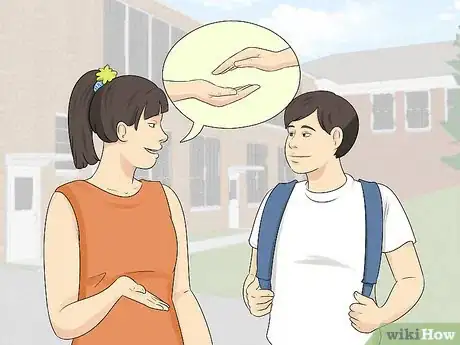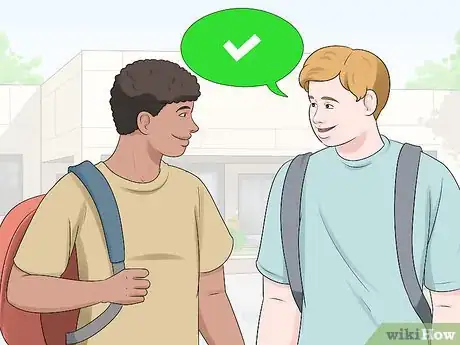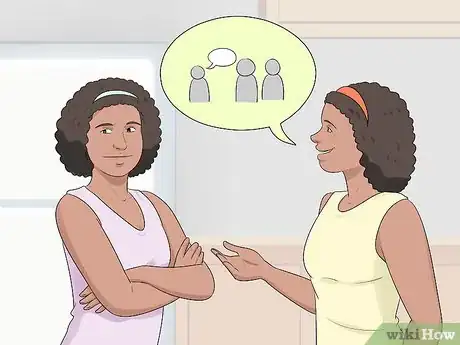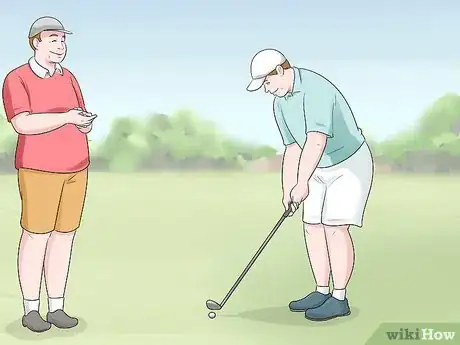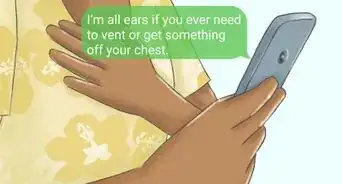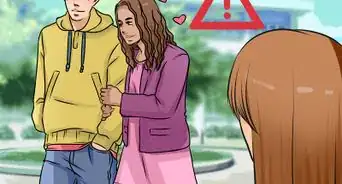This article was co-authored by Michael Dickerson, PsyD. Michael Dickerson is a Clinical Psychologist with over 6 years of experience working in college counseling. He specializes in anxiety, OCD, and men's mental health. Michael holds a BA in Psychology from California State University, Sacramento and a Doctor of Psychology (PsyD) from The Wright Institute in Berkeley CA.
There are 9 references cited in this article, which can be found at the bottom of the page.
This article has been viewed 18,744 times.
Divorce, during any stage of life, can be very difficult on everyone involved. The legalities, the emotions, the nostalgia; sometimes it seems overwhelming. Children of divorce also have their own sadness and anger, and can often feel alone or overlooked while the world around them changes. No matter what stage of life a person goes through a divorce, having the shoulder of a good friend can mean so very much.
Steps
Helping a Child or Teenager Through a Parental Divorce
-
1Be there for your friend. Let them tell you what is going on, what happened, whatever he or she feels like sharing. Never give the impression that you do not believe what your friend is saying, even if what they tell you sounds questionable. Realize that your friend may be angry, or blame one of her parents for the divorce.
- Do not force your friend to talk. Never press them for all the details because they may be embarrassed and, more importantly, it is none of your business. If they say "I don't want to talk about it" then respect their wishes.
- Let them know you are there to listen.[1]
- Ask them if they would like advice or feedback rather than providing unsolicited advice.[2]
- If you have been through a similar situation, you can tell them about it.
-
2Make sure to chat with your friend daily. If the two of you walk to and from school together, start up a neutral conversation, perhaps about homework or a television show you plan to watch that night. If you notice your friend being quiet, ask him/her if they are okay. If you live in different parts of the city, call and chat on the phone, even if it is only for a few minutes each evening.
Let your friend bring up the subject of the divorce, if they choose to. Be a good friend by ensuring that he/she knows that you are always there for them.
Sometimes, when parents get divorced, they are busy making sure that their attorneys know what to do and that they have all the information and documents ready. They might not have time to do things with their children such as ask about their day or talk about problems. You can make yourself available to talk with them and find out how they are doing. It will comforting for your friend to know that they are not alone.Advertisement -
3Support their opinions. It is important for your friend to know that you sincerely care and understand them. Let them vent to you about whatever is on their mind.
When parents are divorcing, children can feel like their world is turned upside down. They have questions, thoughts, concerns, even fears. This is normal.
However, if you feel that your friend is overly worked up, or becoming very depressed and negative, give them a hug or verbal reassurance. Suggest that things will hopefully never get that bad, and remind your friend that you are always there for them.
If you are really worried about your friend's state of mind, it would be a good idea to mention it to your parents. Because the two of you are friends, they will be generally aware of what is going on. Perhaps the two of you can plan to do your homework together at your house, and give your mom a chance to see for herself how your friend is doing. -
4Draw their attention away from their situation at home. Plan a weekend of fun; go to the mall or a recreation center, then go home and do some activities you both enjoy. Maybe you can order a pizza, and stay up late watching your favourite movies.
Sunday you can relax and do some of your hobbies, maybe bake some cookies, or surprise your mom by making dinner. If you have to, ugh, you can even get your homework done together!
You do not have to go out and be doing things all of the time. The idea is to get your friend's mind off what is going on at home. Quality time together is the point. If your friend chooses to talk about her home situation, that is up to her. As always, be supportive. -
5Be open to their emotions. Divorce affects children, adolescents and teens in a variety of ways. They go through a variety of tumultuous emotions; anger, bewilderment, confusion, loneliness, shame and jealousy.[3] Encourage your friend to talk to both of her parents, and let them know how they feel. This is very important for your friend's well being.
Helping a Friend through a Divorce After a Short Marriage (With No Children)
-
1Understand their feelings. The end of a fairy tale. Everyone felt the blushing bride and the handsome groom had the world at their feet. That lasted for a year or two, then things started to change, and the fairy tale was coming to an end. Now, you are the one your friend needs to help them through their pain and heartache.
-
2Be ready to see emotional reactions. Regardless if the end of the marriage was amicable, or if there was anger and animosity, there are a wide range of emotions: Grief, anger, sorrow, guilt, and fear are just some of the feelings that your friend will be going through.[4]
Be their emotional sounding board; let them pour their heart out. Reassure them that they are not alone. Try to get them to go out with you for coffee, or come over to your home for dinner. Isolating themselves with their feelings can be detrimental to their mental health and well being. -
3Support them through the stages of their reactions. The stages of recovering from a divorce are similar to those felt when there is a death in the family. Though every situation is ultimately different, being aware of these stages can help you to understand what your friend is going through:[5]
- Denial: This is when your friend chooses to believe that the situation is just a misunderstanding, that it will all blow over, and that everything can be worked out.
- Resentment and Anger: By laying blame on the spouse who initiated the proceedings, your friend is feeling lost or shell shocked. They do not understand how this could be happening to them, or how their partner could do this.
- Bargaining: This occurs by making commitments to change or the promise to stop a particular action. The hope is to get their spouse to stay.
- Depression: When your friend knows that the marriage is over, the overwhelming feeling of sadness, knowing that is powerless to change the situation, can easily send one into a cycle of depression.
- Acceptance: Realizing that their marriage has ended, and that there is no sense dwelling on it, gives your friend the closure and power to move forward with their life.
-
4Be compassionate. When your friend is first separated, what they need from you is compassion. There will likely be many tear-filled conversations at first, and your presence will help ease his/her pain.
Over the next weeks and months, as the tears subside, and he/she moves through the stages of grief, your understanding and friendship is what will help them transition to a world of being single again.
It is wise to be supportive and join in the conversation appropriately. Negative or harsh comments against your friend's spouse can have a negative impact. You can agree with what your friend says, offer your opinion when asked, but do not initiate or take part in slanderous comments about the spouse. That can backfire on you, as your friend heals and moves on, to the point of even hurting your friendship. -
5Make sure that your friend does not isolate themselves. There can be a tendency after a break up where one just wants to go through the motions; go to work, come home, jump in comfy pajamas and just lie on the couch watching TV.
Try getting them out of the house by suggesting a cup of coffee, or going to a movie. Perhaps on the weekend you could go to a flea market and just browse around.
If you have a busy home life during the week, try to call your friend once a day, just to "check in". Maybe you can make a date for coffee once during the week, or make plans for the weekend. -
6Be available for the arrival of the divorce decree. No matter how strong your friend becomes or how they have grown to accept their new place in the world, the day of the divorce decree is tough.
- In all likelihood, your friend will have told you ahead of time the date that the final decree will be handed down, or shall arrive by courier. In this case, think of making a dinner date in advance. It will give your friend a chance to express any leftover feelings, or even reminisce.
Helping a Friend through a Divorce After a Long Marriage
-
1Understand that divorce after a long marriage is no longer uncommon. Today, with divorce becoming more acceptable in society, more people, who have been in a long-term marriage, are choosing to divorce later in life.
People are living longer, middle aged people still have goals and aspirations they want to achieve, while others have simply grown apart. Getting after a divorce after 20 or 25, even 30 years, also known as a Gray Divorce, is becoming more prominent with the Baby-Boomer generation.[6] -
2Be a primary support when you can. Chances are good that your friend will tell you before even announcing to their adult children, parents or siblings. Being there for your friend at this time will be significant and appreciated.
There is always pain and sadness when a marriage ends, but in all likelihood, it had become a foreseeable outcome for the couple. The reasons why a couple chooses to divorce after decades-long marriage are quite different than when a divorce occurs early in marriage:[7]- Infidelity: Extramarital affairs can be a symptom of a failing marriage, when one or both partners try to regain some of the excitement of their early years. It can be the final straw that breaks the bond of a failing marriage.
- Growing apart: Over the years, the hopes and dreams you had when you were first married can change. What one partner wants out of life may completely differ from that of their spouse. After the kids have grown, you find yourself living with a stranger. The can result with each of you going your separate ways.
- Independence: After years of depending on her spouse financially, women can find a longing to find their independence and gain confidence and happiness in providing for themselves.
- Divorce holds less stigma now: Today, divorce is more acceptable in society than 30 to 40 years ago. Those who stayed married due to social status or because of religious beliefs are now feeling more free to venture down the path of divorce.
- Empty nest syndrome: Once the children have graduated and moved on, be it to college or the working world, the glue that held the marriage together is no longer there. The partners realize (and deep down, have probably known for some time) that without their children, they really have nothing in common.
- Too much time together: Finding themselves in a similar situation as an Empty Nest marriage, the retirement years can bring about the realization of how little the partners have in common. One option is to be happy within their marriage, while pursuing their own interests. The other is to part ways and ultimately divorce.
-
3Help them deal with other people's reactions to the divorce. When your friend announces to family and friends the decision to divorce, he/she will receive a variety of reactions. That is when they are going to need you for morale support.
Their children will likely be the most vocal about their opinion of their parents decision. Your friend will need to be prepared not only for reactions of sadness and concern, but possibly anger and demanding questions. -
4Make sure to say the words "I'm here for you, in any way you need" with sincerity. Even if there were tell tale signs in the last few years of the impending end to the marriage, it will always take an emotional toll on a person.
If you have been friends for years, it likely will not take a lot of prompting on your part to get your friend to talk about what is going on. Just watch that he/she is not withdrawing and bottling up their emotions. -
5Provide distractions. As with divorce at any age, distractions will always be welcome. Try to set up some regular outings; if the two of you are golfers, make a date for golf once or twice a week and then go for dinner. Perhaps your friend enjoys the theater. If you enjoy the theater, perhaps you could take in some events together.
- Possibly one of the most difficult adjustments to make after divorcing, especially when it occurs later in life, is learning to be comfortable doing things on their own. No matter how the couple's interests changed over time, at this stage, it was likely they were at least comfortable in each other's company. Going out to a movie theater, for dinner, or even just going out for a cup of coffee was something your friend has possibly never done on their own.
-
6Help them to adjust to their new position in life. Going on these outings as friends rather than as a couple will help with the transition.
Make plans to meet at the grocery store, or at the mall to go window shopping, each taking your own transportation. This will give your friend the chance to run a couple of other errands after you meet up, and getting used to doing these things on their own. -
7Be prepared for a remarkable change in your friend. You may find that single life was just what they needed. They may not go through any transition period whatsoever at living life on their own.
You may even be surprised to find them taking trips, or sporting a new look. Divorce at this age can be revitalizing, and if this is a case, be there to enjoy and encourage your friend's new life.
Community Q&A
-
QuestionHow do I help a child friend with his parents going through a divorce?
 Grace AkinyemiCommunity AnswerBe there for them. They'll go through lots of stages, and you should be there for them as a support and to lend an ear. Even if you don't know what to say, they'll appreciate that you are listening.
Grace AkinyemiCommunity AnswerBe there for them. They'll go through lots of stages, and you should be there for them as a support and to lend an ear. Even if you don't know what to say, they'll appreciate that you are listening.
References
- ↑ https://thevou.com/lifestyle/how-to-comfort-cheer-up-make-someone-feel-better/
- ↑ https://psychcentral.com/blog/imperfect/2020/02/its-time-to-stop-giving-unsolicited-advice#How-to-stop-giving-unsolicited-advice
- ↑ http://divorcedmoms.com/articles/emotional-stages-kids-experience-when-parents-divorce
- ↑ http://www.womansdivorce.com/emotional-stages-of-divorce.html
- ↑ http://www.womansdivorce.com/emotional-stages-of-divorce.html
- ↑ https://www.equitablemediation.com/blog/divorce-after-20-years
- ↑ https://www.liveabout.com/reasons-long-term-marriages-end-in-divorce-1102921
- ↑ http://divorce.lovetoknow.com/Historical_Divorce_Rate_Statistics
- ↑ https://www.infoplease.com/us/marital-status/marriages-and-divorces-1900a2012
